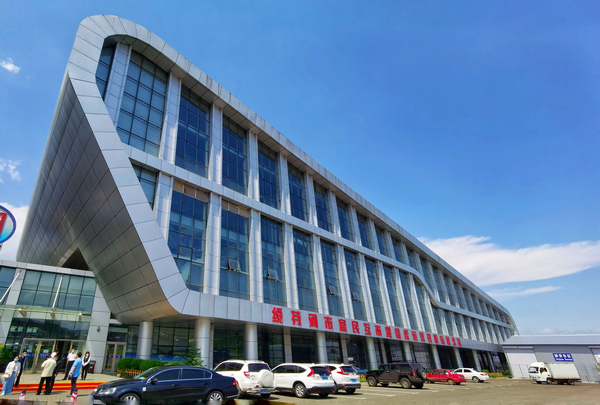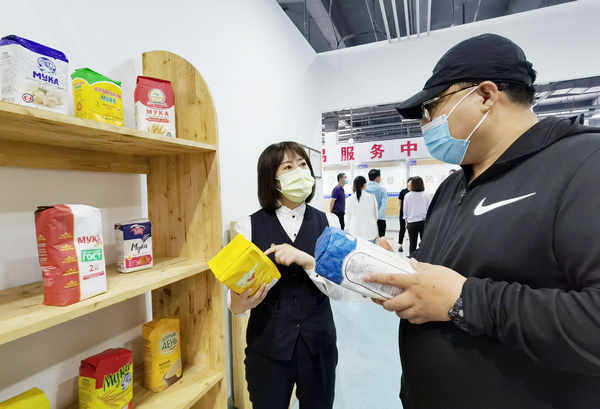Cross-border appeal sees benefit of free trade

The free trade zone market in Suifenhe, Heilongjiang province. SHAO GUOLIANG/FOR CHINA DAILY
Every few days, Zhao Changqing goes to buy daily necessities imported from Russia in the free trade zone market in Suifenhe, Heilongjiang province.
"In the market, I have a lot of choices for high-quality and genuine Russian commodities, such as candy, chocolate, flour, pine nuts and frozen fish," says the 65-year-old retired civil servant. "Moreover, the price is definitely lower than in ordinary shops."
On Aug 9, 2011, Harbin Customs officially approved the establishment of a free trade market in Suifenhe to promote border trade in the city.
According to the policy, residents in Suifenhe can buy duty-free commodities with quotas of 8,000 yuan ($1,192) per day.
About 190 kilometers from Vladivostok, one of the largest cities in Russia's Far East, Suifenhe has 150,000 residents. It is the biggest Sino-Russian trade hub in Heilongjiang.
In 2019, per capita disposable income of urban residents in the city reached 39,600 yuan, ranking at the top of the province, according to local government.
In August 2019, the Heilongjiang Pilot Free Trade Zone, the northernmost FTZ in China, was officially established.
Suifenhe became one of the three areas in the zone, together with the cities of Harbin and Heihe.
To benefit more border residents and promote its border trade, Suifenhe encourages Russian businessmen in the free trade zone to cooperate with importers from neighboring countries.
By the end of 2019, the city had seen its free trade zone with Russia open to 14 more countries including Mongolia and the Republic of Korea, the city government said.
"We hope to see more high-quality and inexpensive commodities from different countries enter the Chinese market through the cross-border trade platform in Suifenhe, meeting the growing demand of consumers," says Bao Huixin, deputy director of the Suifenhe Free Trade Zone Administration.
"It will also play an important role in promoting the transformation and upgrading of the city's foreign trade industry," she says.
In the first eight months of 2020, over 72,000 metric tons of commodities were imported to the Suifenhe Free Trade Zone, a year-on-year growth of 155.62 percent. Import volume reached 343.9 million yuan, representing a growth of 2.6 percent over the same period in 2019, the local government said.

A staff member at the market introduces a pack of Russian flour to a customer. SHAO GUOLIANG/FOR CHINA DAILY
The opening of the city has also attracted lots of Russians to start their business there.
In the autumn of 2016, Igor Gorshkov quit his job in Moscow and, with a friend, opened a Russian sausage factory in Suifenhe.
"During my first visit to Suifenhe in the summer of 2016, I found a favorable business environment in the city and huge market potential for my products," says the 53-year-old man. "The government established the 'Russian Start-up Street' and provided places free for three years, which greatly attracted us."
In May 2018, Gorshkov expanded the factory's area with an investment from Chinese businessman Wang Dongkui.
"At first, I was just one of Gorshkov's customers," says Wang, who has been engaged in trade with Russia for more than 20 years. "When I found out that he had some difficulties in follow-up funding and expanding the business, I decided to join."
Wang provided them with a 600-square-meter plant as well as a sales plan.
"We keep the authentic Russian flavor and only reduce the salt in the formula to cater to Chinese tastes," says Wang. "And it works."
Their sausages have been sold to many parts of China, including the provinces of Jilin, Liaoning, Shandong and Guangdong.
"I feel proud to bring the traditional Russian sausages to Suifenhe, which helps to spread Russian food culture," says Gorshkov. "We believe there will be more China-Russia partners in the future with better cooperation."


